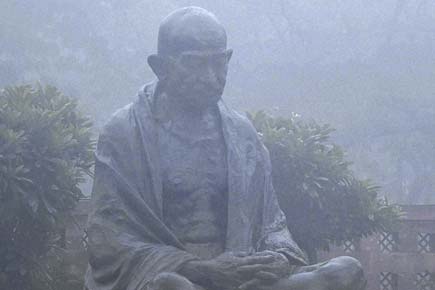Two places have stood out for me personally, whenever I wanted to be within myself or more often than not, without

 Two places have stood out for me personally, whenever I wanted to be within myself or more often than not, without. The first is Mani Bhavan in Mumbai, and the second is the Sabarmati Ashram in Ahmedabad. Both are humbling experiences, but they are not belittling ones. I balk at using the word “inspiring” because few, if any of us, can claim to have achieved anything close to the man and the thought behind both institutions.
Two places have stood out for me personally, whenever I wanted to be within myself or more often than not, without. The first is Mani Bhavan in Mumbai, and the second is the Sabarmati Ashram in Ahmedabad. Both are humbling experiences, but they are not belittling ones. I balk at using the word “inspiring” because few, if any of us, can claim to have achieved anything close to the man and the thought behind both institutions.
Every so often, there is an argument in India about why M K Gandhi never won the Nobel Peace Prize. And every so often, we come to the same conclusion, which is: his achievements are neither diluted nor diminished because he did not.
ADVERTISEMENT

The truth of it: Gandhi is one of the few men in India who faced both criticism and adulation in his lifetime and after, much unlike the sort of hero-worship that Indian society bestows regularly on film stars, cricketers and the occasional politician. Representation Pic/PTI
It is also true that Gandhi is one of the few men in India who faced both criticism and adulation in his lifetime and after, much unlike the sort of hero-worship that Indian society bestows regularly on film stars, cricketers and the occasional politician. Gandhi asked uncomfortable questions, held himself and others, especially those close to him, to uncomfortable standards, and did not spare himself when it came to searching scrutiny. A man who calls his autobiography My Experiments with Truth is not a man who would choose a fan club over his own contradictions.
But what about Gandhi’s assassin, Nathuram Godse? Was he a much misunderstood cutie-pie who did just one wrong thing in his whole life and has been damned (and hanged) for it since? Ever since the Hindu Mahasabha announced that it is going to put up statues of Godse all over India, some Indian intellectuals have come out batting for Godse. The argument often is that, as a “good liberal”, you have to respect all points of view.
Indeed. So what did Godse do? He shot dead a frail, unarmed old man. The reason was, at best, a political disagreement, and at worst, religious hatred. Assassinating Gandhi did not at that time help Godse’s cause.
And ironically today, Godse has admirers and the Indian polity pays lip service to Gandhi while ignoring most of what he stood for. Can we indeed pat ourselves on the back for our immense tolerance of all viewpoints?
For some in the BJP and the Sangh Parivar, though, the Hindu Mahasabha’s call for Godse statues is a trifle embarrassing, since Prime Minister Narendra Modi has been trying to appropriate Gandhi for his party. And then there’s the man whom the Sangh Parivar has long tried to appropriate, Sardar Vallabhbhai Patel, who banned the RSS after Godse assassinated Gandhi. The connections between segments of the Sangh Parivar are not as tenuous as their friends outside like to pretend.
The Hindu Mahasabha may not be as influential as it once was, but it is an essential block in the history of the Hindutva movement. Not quite the “fringe element” we are being made to believe. And all segments of the larger Sangh Parivar have found the loudspeakers ever since the BJP came to power at the Centre in May, 2014. Regressive thought processes, fantastical history, religious supremacism, anti-minority rhetoric and action it’s all back at centre stage.
Back to Godse then, who had no doubt that he would pay the price for what he had done. He made no excuses unlike his current-day apologists and his explanation for killing Gandhi rests almost solely on what he considers Muslim appeasement he refers to Gandhi as the “Father of Pakistan”. In that phrase lies the kernel of every insult that every person in India who does not hold allegiance to the Hindutva ideology has to hear every day. Godse killed on a hate principle.
Mistaken, controversial, difficult though Gandhi may have been, but he still stands at the opposite end of the hate principle. In spite of every effort made by Indian politicians, Indian society, wannabe intellectuals and the might of the Hindutva army, he withstands. Killing Gandhi did not take help Godse’s cause. Making excuses for Godse is an even weaker attempt. But, it’s alright. A few moments alone in Mani Bhavan or the Sabarmati Ashram might make you feel better. Try it. Being tolerant after all cuts both ways.
Ranjona Banerji is a senior journalist. You can follow her on twitter @ranjona
 Subscribe today by clicking the link and stay updated with the latest news!" Click here!
Subscribe today by clicking the link and stay updated with the latest news!" Click here!







